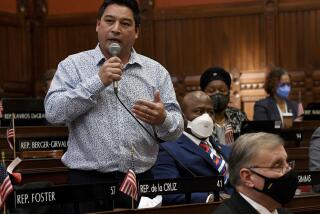Boost for the Best
- Share via
Back in 1816, when members of Congress received a salary of $6 a day, both houses voted to raise their pay to $1,500 for each yearly session. But the outcry was so intense that Congress repealed the pay increase the very next year. Some things just don’t change. The matter of setting salaries for themselves and other federal officials remains one of Congress’ thorniest political issues.
Since 1969, presidential commissions have documented the fact that salaries for federal officeholders and the top appointed officials, including judges, have lagged far behind those of the most nearly comparable positions in business, industry and even state and local government. The latest commission has just reported, for instance, that federal district judges receive $81,100 while the average income for all lawyers in the United States is more than $100,000 and most partners in larger firms get around $225,000.
Cabinet officers--who serve, in effect, as presidents of enterprises with hundreds of thousands of employees and budgets in the billions--get $88,800 while their counterparts in the private sector routinely receive handsome six-figure salaries plus stock options and other benefits. City managers of large municipalities average more than $110,000 a year. Many fire chiefs, police chiefs, educators and others are paid better than Cabinet officers and directors of major federal regulatory agencies and commissions.
The commission has now proposed to President Reagan a salary schedule covering 3,037 officials that would raise Cabinet officers’ salaries to $160,000 a year, deputies to $135,000, members of Congress to $135,000 and federal district judges to $130,000.
If the story is a familiar one, so is the response. There is some sympathy for those hard-working, dedicated public officials whose pay has been far outstripped by inflation over the years and who toil away for far less than they might receive outside government. The report says, “The gap is so wide one might wonder why anyone would serve in government.”
There also is outrage that government officials would even think of raising their salaries by 60% when the average American is struggling along on far less and when the nation is piling up massive budget deficits. Consumer advocate Ralph Nader labeled the proposed increases an outlandish salary grab.
There will be political flak, but now is the time for the President and Congress to make a bold move and approve the salary schedule as proposed by the commission. Included would be a ban on such outside congressional income as speech honorariums--the only way that Congress could rationalize receiving such a big increase at one time--and safeguards against capitalizing on one’s federal duties after he has left the job. When pay scales become second-rate, so will personnel. In these days we need the best.
More to Read
Get the L.A. Times Politics newsletter
Deeply reported insights into legislation, politics and policy from Sacramento, Washington and beyond. In your inbox twice per week.
You may occasionally receive promotional content from the Los Angeles Times.










